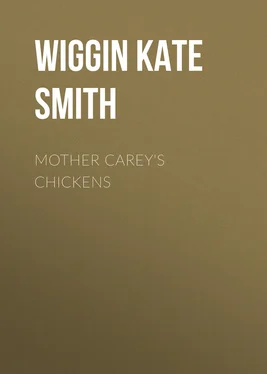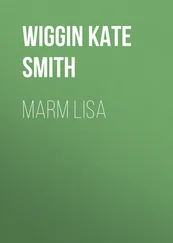Kate Wiggin - Mother Carey's Chickens
Здесь есть возможность читать онлайн «Kate Wiggin - Mother Carey's Chickens» — ознакомительный отрывок электронной книги совершенно бесплатно, а после прочтения отрывка купить полную версию. В некоторых случаях можно слушать аудио, скачать через торрент в формате fb2 и присутствует краткое содержание. Издательство: Иностранный паблик, Жанр: foreign_prose, foreign_antique, на английском языке. Описание произведения, (предисловие) а так же отзывы посетителей доступны на портале библиотеки ЛибКат.
- Название:Mother Carey's Chickens
- Автор:
- Издательство:Иностранный паблик
- Жанр:
- Год:неизвестен
- ISBN:нет данных
- Рейтинг книги:5 / 5. Голосов: 1
-
Избранное:Добавить в избранное
- Отзывы:
-
Ваша оценка:
- 100
- 1
- 2
- 3
- 4
- 5
Mother Carey's Chickens: краткое содержание, описание и аннотация
Предлагаем к чтению аннотацию, описание, краткое содержание или предисловие (зависит от того, что написал сам автор книги «Mother Carey's Chickens»). Если вы не нашли необходимую информацию о книге — напишите в комментариях, мы постараемся отыскать её.
Mother Carey's Chickens — читать онлайн ознакомительный отрывок
Ниже представлен текст книги, разбитый по страницам. Система сохранения места последней прочитанной страницы, позволяет с удобством читать онлайн бесплатно книгу «Mother Carey's Chickens», без необходимости каждый раз заново искать на чём Вы остановились. Поставьте закладку, и сможете в любой момент перейти на страницу, на которой закончили чтение.
Интервал:
Закладка:
It was a good idea, and the dose had courage in it. Gilbert took the first sip, Kathleen the second, and Nancy the third, and hardly had the last swallow disappeared down the poor aching throats before a carriage drove up to the gate. Some one got out and handed out Mrs. Carey whose step used to be lighter than Nancy's. A strange gentleman, oh! not a stranger, it was the dear Admiral helping mother up the path. They had been unconsciously expecting the brown muff and blue velvet bonnet, but these had vanished, like father, and all the beautiful things of the past years, and in their place was black raiment that chilled their hearts. But the black figure had flung back the veil that hid her from the longing eyes of the children, and when she raised her face it was full of the old love. She was grief-stricken and she was pale, but she was mother, and the three young things tore open the door and clasped her in their arms, sobbing, choking, whispering all sorts of tender comfort, their childish tears falling like healing dew on her poor heart. The Admiral soothed and quieted them each in turn, all but Nancy. Cousin Ann's medicine was of no avail, and strangling with sobs Nancy fled to the attic until she was strong enough to say "for mother's sake" without a quiver in her voice. Then she crept down, and as she passed her mother's room on tiptoe she looked in and saw that the chair by the window, the chair that had been vacant for a month, was filled, and that the black-clad figure was what was left to them; a strange, sad, quiet mother, who had lost part of herself somewhere,—the gay part, the cheerful part, the part that made her so piquantly and entrancingly different from other women. Nancy stole in softly and put her young smooth cheek against her mother's, quietly stroking her hair. "There are four of us to love you and take care of you," she said. "It isn't quite so bad as if there was nobody!"
Mrs. Carey clasped her close. "Oh! my Nancy! my first, my oldest, God will help me, I know that, but just now I need somebody close and warm and soft; somebody with arms to hold and breath to speak and lips to kiss! I ought not to sadden you, nor lean on you, you are too young, —but I must a little, just at the first. You see, dear, you come next to father!"
"Next to father!" Nancy's life was set to a new tune from that moment. Here was her spur, her creed; the incentive, the inspiration she had lacked. She did not suddenly grow older than her years, but simply, in the twinkling of an eye, came to a realization of herself, her opportunity, her privilege, her duty; the face of life had changed, and Nancy changed with it.
"Do you love me next to mother?" the Admiral had asked coaxingly once when Nancy was eight and on his lap as usual.
"Oh dear no!" said Nancy thoughtfully, shaking her head.
"Why, that's rather a blow to me," the Admiral exclaimed, pinching an ear and pulling a curl. "I flattered myself that when I was on my best behavior I came next to mother."
"It's this way, Addy dear," said Nancy, cuddling up to his waistcoat and giving a sigh of delight that there were so many nice people in the world. "It's just this way. First there's mother, and then all round mother there's a wide, wide space; and then father and you come next the space."
The Admiral smiled; a grave, lovely smile that often crept into his eyes when he held Mother Carey's chickens on his knee. He kissed Nancy on the little white spot behind the ear where the brown hair curled in tiny rings like grape tendrils, soft as silk and delicate as pencil strokes. He said nothing, but his boyish dreams were in the kiss, and certain hopes of manhood that had never been realized. He was thinking that Margaret Gilbert was a fortunate and happy woman to have become Mother Carey; such a mother, too, that all about her was a wide, wide space, and next the space, the rest of the world, nearer or farther according to their merits. He wondered if motherhood ought not to be like that, and he thought if it were it would be a great help to God.
V
HOW ABOUT JULIA?
We often speak of a family circle, but there are none too many of them. Parallel lines never meeting, squares, triangles, oblongs, and particularly those oblongs pulled askew, known as rhomboids, these and other geometrical figures abound, but circles are comparatively few. In a true family circle a father and a mother first clasp each other's hands, liking well to be thus clasped; then they stretch out a hand on either side, and these are speedily grasped by children, who hold one another firmly, and complete the ring. One child is better than nothing, a great deal better than nothing; it is at least an effort in the right direction, but the circle that ensues is not, even then, a truly nice shape. You can stand as handsomely as ever you like, but it simply won't "come round." The minute that two, three, four, five, join in, the "roundness" grows, and the merriment too, and the laughter, and the power to do things. (Responsibility and care also, but what is the use of discouraging circles when there are not enough of them anyway?)
The Carey family circle had been round and complete, with love and harmony between all its component parts. In family rhomboids, for instance, mother loves the children and father does not, or father does, but does not love mother, or father and mother love each other and the children do not get their share; it is impossible to enumerate all the little geometrical peculiarities which keep a rhomboid from being a circle, but one person can just "stand out" enough to spoil the shape, or put hands behind back and refuse to join at all. About the ugliest thing in the universe is that non-joining habit! You would think that anybody, however dull, might consider his hands, and guess by the look of them that they must be made to work, and help, and take hold of somebody else's hands! Miserable, useless, flabby paws, those of the non-joiner; that he feeds and dresses himself with, and then hangs to his selfish sides, or puts behind his beastly back!
When Captain Carey went on his long journey into the unknown and uncharted land, the rest of the Careys tried in vain for a few months to be still a family, and did not succeed at all. They clung as closely to one another as ever they could, but there was always a gap in the circle where father had been. Some men, silent, unresponsive, absent-minded and especially absorbed in business, might drop out and not be missed, but Captain Carey was full of vitality, warmth, and high spirits. It is strange so many men think that the possession of a child makes them a father; it does not; but it is a curious and very general misapprehension. Captain Carey was a boy with his boys, and a gallant lover with his girls; to his wife—oh! we will not even touch upon that ground; she never did, to any one or anything but her own heart! Such an one could never disappear from memory, such a loss could never be made wholly good. The only thing to do was to remember father's pride and justify it, to recall his care for mother and take his place so far as might be; the only thing for all, as the months went on, was to be what mother called the three b's,—brave, bright, and busy.
To be the last was by far the easiest, for the earliest effort at economy had been the reluctant dismissal of Joanna, the chambermaid. In old-fashioned novels the devoted servant always insisted on remaining without wages, but this story concerns itself with life at a later date. Joanna wept at the thought of leaving, but she never thought of the romantic and illogical expedient of staying on without compensation.
Captain Carey's salary had been five thousand dollars, or rather was to have been, for he had only attained his promotion three months before his death. There would have been an extra five hundred dollars a year when he was at sea, and on the strength of this addition to their former income he intended to increase the amount of his life insurance, but it had not yet been done when the sudden illness seized him, an illness that began so gently and innocently and terminated with such sudden and unexpected fatality.
Читать дальшеИнтервал:
Закладка:
Похожие книги на «Mother Carey's Chickens»
Представляем Вашему вниманию похожие книги на «Mother Carey's Chickens» списком для выбора. Мы отобрали схожую по названию и смыслу литературу в надежде предоставить читателям больше вариантов отыскать новые, интересные, ещё непрочитанные произведения.
Обсуждение, отзывы о книге «Mother Carey's Chickens» и просто собственные мнения читателей. Оставьте ваши комментарии, напишите, что Вы думаете о произведении, его смысле или главных героях. Укажите что конкретно понравилось, а что нет, и почему Вы так считаете.












